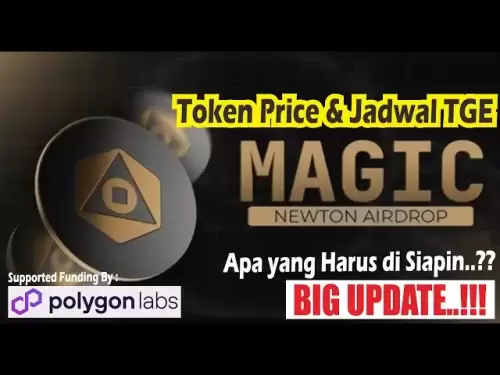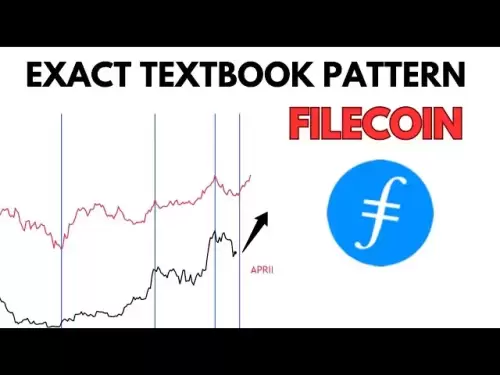-
 Bitcoin
Bitcoin $99,594.2189
-3.59% -
 Ethereum
Ethereum $2,188.5793
-9.00% -
 Tether USDt
Tether USDt $1.0001
-0.02% -
 XRP
XRP $1.9745
-5.82% -
 BNB
BNB $608.9511
-3.73% -
 Solana
Solana $130.4575
-5.93% -
 USDC
USDC $1.0000
0.01% -
 TRON
TRON $0.2637
-3.59% -
 Dogecoin
Dogecoin $0.1493
-5.97% -
 Cardano
Cardano $0.5322
-6.72% -
 Hyperliquid
Hyperliquid $33.9044
3.33% -
 Bitcoin Cash
Bitcoin Cash $449.6411
-5.46% -
 UNUS SED LEO
UNUS SED LEO $8.9629
0.43% -
 Sui
Sui $2.3943
-8.35% -
 Chainlink
Chainlink $11.4402
-7.83% -
 Stellar
Stellar $0.2241
-6.49% -
 Avalanche
Avalanche $16.1489
-4.24% -
 Toncoin
Toncoin $2.7182
-5.94% -
 Shiba Inu
Shiba Inu $0.0...01040
-5.72% -
 Litecoin
Litecoin $78.7882
-4.07% -
 Ethena USDe
Ethena USDe $1.0004
-0.01% -
 Hedera
Hedera $0.1305
-7.45% -
 Monero
Monero $297.0030
-5.32% -
 Dai
Dai $0.9997
-0.02% -
 Polkadot
Polkadot $3.1834
-6.03% -
 Bitget Token
Bitget Token $3.9788
-7.03% -
 Uniswap
Uniswap $6.1327
-10.62% -
 Pepe
Pepe $0.0...08689
-8.30% -
 Pi
Pi $0.4826
-9.65% -
 Aave
Aave $219.8043
-9.69%
What is the format of the Bitcoincoin wallet address? Summary of common questions
Dogecoin wallet addresses start with "D," are 34 characters long, and are case-sensitive; use reputable wallets like Dogecoin Core or Ledger to generate them securely.
May 13, 2025 at 10:15 am
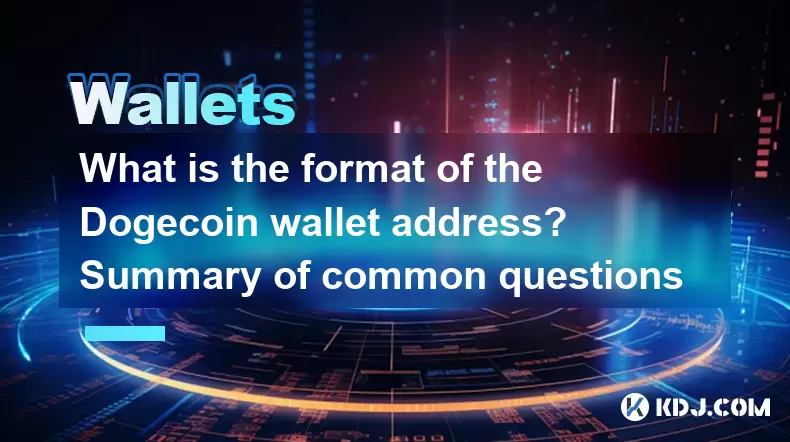
Dogecoin, a popular cryptocurrency inspired by the "Doge" meme, has its own unique wallet address format that users must understand to send and receive DOGE securely. This article will delve into the specifics of the Dogecoin wallet address format and address common questions related to it.
Understanding Dogecoin Wallet Address Format
The Dogecoin wallet address is a unique string of characters that serves as a destination for sending and receiving Dogecoin. The format of a Dogecoin address typically begins with the letter "D" followed by a series of alphanumeric characters. A standard Dogecoin address looks something like this: D6QK71mNwBKF59tJqYt2v4m4UqN18wT1iC.
The length of a Dogecoin address can vary, but it usually consists of 34 characters. These characters are derived from the public key associated with the wallet, using a cryptographic hash function to ensure security and uniqueness. It's important to note that Dogecoin addresses are case-sensitive, meaning that "D" and "d" are not interchangeable.
How to Generate a Dogecoin Wallet Address
Generating a Dogecoin wallet address involves using a Dogecoin wallet, which can be either a software wallet, a hardware wallet, or a web-based wallet. Here are the steps to generate a Dogecoin wallet address:
- Choose a Dogecoin Wallet: Select a reputable Dogecoin wallet such as Dogecoin Core, Exodus, or a hardware wallet like Ledger.
- Install and Set Up the Wallet: Follow the installation instructions provided by the wallet provider. For software wallets, this typically involves downloading and installing the software on your computer.
- Create a New Wallet: Once the wallet is installed, create a new wallet. This process will involve generating a new set of private and public keys.
- Access Your Address: After the wallet is set up, you can access your Dogecoin address. In most wallets, this can be done by clicking on the "Receive" tab or a similar option.
Verifying a Dogecoin Wallet Address
Verifying a Dogecoin wallet address is crucial to ensure that you are sending your DOGE to the correct recipient. Here are some methods to verify a Dogecoin address:
- Manual Verification: Carefully compare the address displayed on your screen with the one you intend to use. Ensure that every character matches, paying close attention to case sensitivity.
- Using a QR Code: Many wallets allow you to scan a QR code to input the address. This method can reduce the risk of manual entry errors.
- Address Book: Some wallets have an address book feature where you can save frequently used addresses. This can help in verifying addresses before sending DOGE.
Common Mistakes to Avoid with Dogecoin Wallet Addresses
When dealing with Dogecoin wallet addresses, it's important to avoid common mistakes that can lead to loss of funds. Here are some pitfalls to watch out for:
- Typographical Errors: A single incorrect character can result in sending your DOGE to the wrong address. Always double-check the address before confirming a transaction.
- Case Sensitivity: As mentioned earlier, Dogecoin addresses are case-sensitive. Ensure that you use the correct capitalization when entering an address.
- Sending to Incorrect Network: Dogecoin addresses are specific to the Dogecoin network. Sending DOGE to a Bitcoin or Ethereum address, for example, will result in the loss of funds.
Using Dogecoin Wallet Addresses for Transactions
To use your Dogecoin wallet address for transactions, follow these steps:
- Sending Dogecoin: To send DOGE, navigate to the "Send" tab in your wallet. Enter the recipient's Dogecoin address, specify the amount of DOGE you want to send, and confirm the transaction. Ensure that you have enough DOGE in your wallet to cover the transaction fee.
- Receiving Dogecoin: To receive DOGE, share your Dogecoin address with the sender. You can usually find your address in the "Receive" tab of your wallet. Once the sender initiates the transaction, the DOGE will be credited to your wallet once the transaction is confirmed on the blockchain.
Frequently Asked Questions
Q: Can I reuse a Dogecoin wallet address?
A: Yes, you can reuse a Dogecoin wallet address. However, for enhanced privacy and security, it's recommended to use a new address for each transaction.
Q: What happens if I send Dogecoin to a Bitcoin address?
A: If you send Dogecoin to a Bitcoin address, the transaction will fail, and your DOGE will be lost. Always ensure that you are using the correct network and address format.
Q: How can I store my Dogecoin wallet address securely?
A: To store your Dogecoin wallet address securely, consider using a hardware wallet, which keeps your private keys offline. Additionally, you can write down your address on a piece of paper and store it in a safe place, away from digital threats.
Q: Are there any fees associated with Dogecoin transactions?
A: Yes, there are transaction fees associated with sending Dogecoin. The fee amount can vary depending on the network congestion and the specific wallet you are using. Always check the fee before confirming a transaction.
Disclaimer:info@kdj.com
The information provided is not trading advice. kdj.com does not assume any responsibility for any investments made based on the information provided in this article. Cryptocurrencies are highly volatile and it is highly recommended that you invest with caution after thorough research!
If you believe that the content used on this website infringes your copyright, please contact us immediately (info@kdj.com) and we will delete it promptly.
- BTC, Iran Strike, and Markets: Navigating Geopolitical Tensions
- 2025-06-23 10:25:12
- MAGACOIN, Ethereum, Avalanche: A New Wave or Legacy Chains?
- 2025-06-23 10:25:12
- BlockDAG, Crypto Coins, and Leading Trends: What's Hot in 2025?
- 2025-06-23 10:45:12
- PEPE Exit, SUI Calls, and BlockDAG Coin: What's the Smart Money Doing?
- 2025-06-23 10:45:12
- Grant Cardone, Bitcoin, and Expansion: A New York State of Mind
- 2025-06-23 11:05:11
- Solana, Aptos, and Stable Tokens: Wyoming's Bold Move and the Future of Finance
- 2025-06-23 08:25:12
Related knowledge
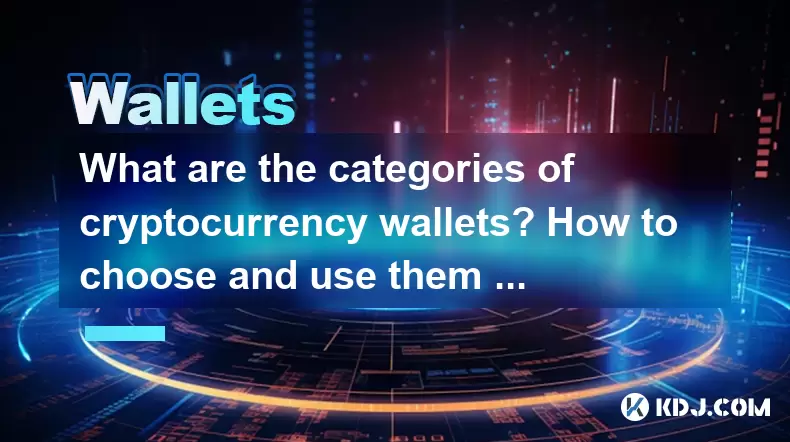
What are the categories of cryptocurrency wallets? How to choose and use them safely?
Jun 21,2025 at 10:42pm
Understanding Cryptocurrency WalletsCryptocurrency wallets are essential tools for anyone involved in the digital asset ecosystem. They allow users to store, send, and receive cryptocurrencies securely. Unlike traditional wallets that hold physical money, crypto wallets manage cryptographic keys—private and public—which interact with blockchain networks...
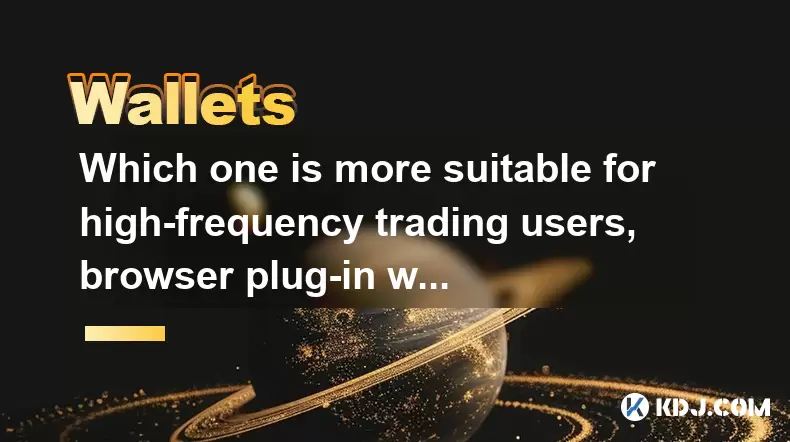
Which one is more suitable for high-frequency trading users, browser plug-in wallets or independent application wallets?
Jun 23,2025 at 08:22am
Understanding the Role of Wallets in High-Frequency TradingFor high-frequency trading (HFT) users in the cryptocurrency market, wallet selection is critical due to the need for speed, security, and seamless integration with trading platforms. HFT involves executing a large number of trades within seconds or even milliseconds, which demands a wallet that...
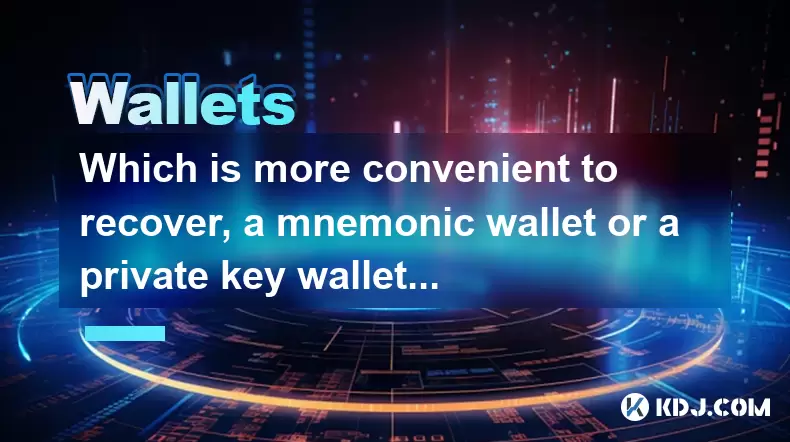
Which is more convenient to recover, a mnemonic wallet or a private key wallet? Will security be compromised?
Jun 20,2025 at 06:36am
Understanding Mnemonic Wallets and Private Key WalletsIn the world of cryptocurrency, wallet recovery is a crucial aspect that users must understand before storing digital assets. Two popular methods for securing and recovering wallets are mnemonic phrases and private keys. Both serve as gateways to access funds, but they differ significantly in terms o...
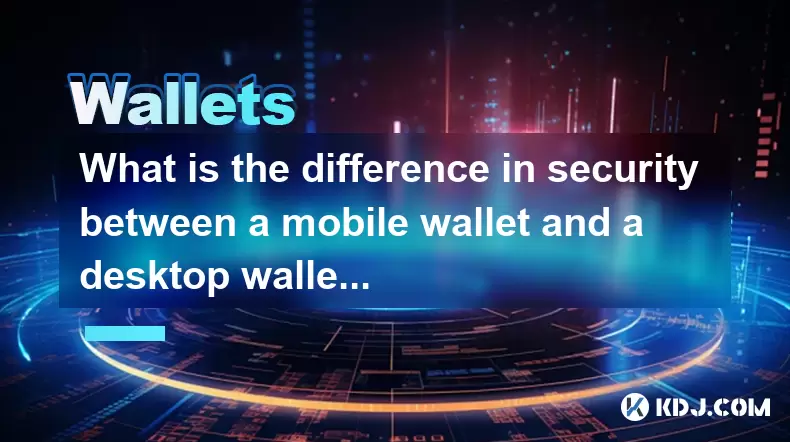
What is the difference in security between a mobile wallet and a desktop wallet?
Jun 22,2025 at 12:35pm
Understanding the Security Aspects of Mobile WalletsMobile wallets are digital wallets designed to run on smartphones, allowing users to store, send, and receive cryptocurrencies conveniently. The security of mobile wallets largely depends on how well the device is protected from malware, phishing attacks, and unauthorized access. One key feature of mob...
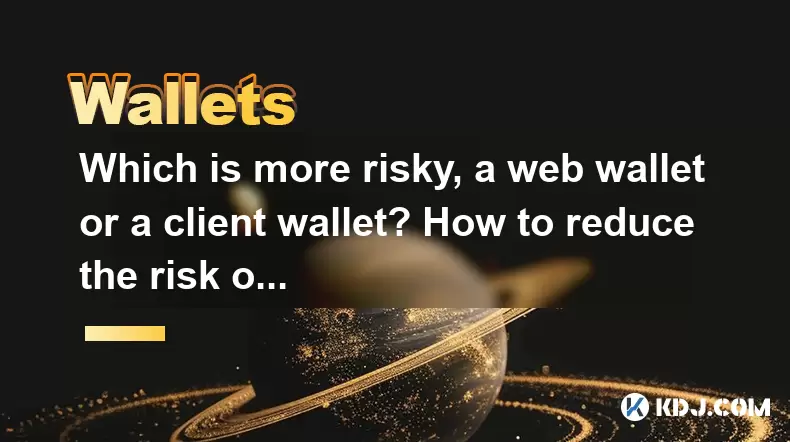
Which is more risky, a web wallet or a client wallet? How to reduce the risk of use?
Jun 22,2025 at 09:21pm
Understanding Web Wallets and Client WalletsWhen managing cryptocurrencies, choosing the right type of wallet is crucial. Web wallets and client wallets are two popular options among users, each with its own set of advantages and disadvantages. A web wallet operates through a browser interface and is usually hosted online by third-party services. This m...
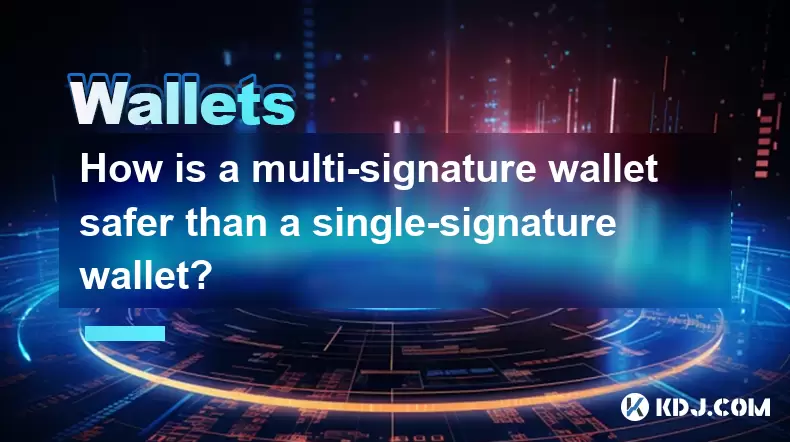
How is a multi-signature wallet safer than a single-signature wallet?
Jun 21,2025 at 07:56pm
Understanding Signature Mechanisms in Cryptocurrency WalletsIn the world of cryptocurrency, securing digital assets is paramount. One of the core aspects of this security lies in the signature mechanism used by wallets. A single-signature wallet requires only one private key to authorize a transaction. This means that if an attacker gains access to that...

What are the categories of cryptocurrency wallets? How to choose and use them safely?
Jun 21,2025 at 10:42pm
Understanding Cryptocurrency WalletsCryptocurrency wallets are essential tools for anyone involved in the digital asset ecosystem. They allow users to store, send, and receive cryptocurrencies securely. Unlike traditional wallets that hold physical money, crypto wallets manage cryptographic keys—private and public—which interact with blockchain networks...

Which one is more suitable for high-frequency trading users, browser plug-in wallets or independent application wallets?
Jun 23,2025 at 08:22am
Understanding the Role of Wallets in High-Frequency TradingFor high-frequency trading (HFT) users in the cryptocurrency market, wallet selection is critical due to the need for speed, security, and seamless integration with trading platforms. HFT involves executing a large number of trades within seconds or even milliseconds, which demands a wallet that...

Which is more convenient to recover, a mnemonic wallet or a private key wallet? Will security be compromised?
Jun 20,2025 at 06:36am
Understanding Mnemonic Wallets and Private Key WalletsIn the world of cryptocurrency, wallet recovery is a crucial aspect that users must understand before storing digital assets. Two popular methods for securing and recovering wallets are mnemonic phrases and private keys. Both serve as gateways to access funds, but they differ significantly in terms o...

What is the difference in security between a mobile wallet and a desktop wallet?
Jun 22,2025 at 12:35pm
Understanding the Security Aspects of Mobile WalletsMobile wallets are digital wallets designed to run on smartphones, allowing users to store, send, and receive cryptocurrencies conveniently. The security of mobile wallets largely depends on how well the device is protected from malware, phishing attacks, and unauthorized access. One key feature of mob...

Which is more risky, a web wallet or a client wallet? How to reduce the risk of use?
Jun 22,2025 at 09:21pm
Understanding Web Wallets and Client WalletsWhen managing cryptocurrencies, choosing the right type of wallet is crucial. Web wallets and client wallets are two popular options among users, each with its own set of advantages and disadvantages. A web wallet operates through a browser interface and is usually hosted online by third-party services. This m...

How is a multi-signature wallet safer than a single-signature wallet?
Jun 21,2025 at 07:56pm
Understanding Signature Mechanisms in Cryptocurrency WalletsIn the world of cryptocurrency, securing digital assets is paramount. One of the core aspects of this security lies in the signature mechanism used by wallets. A single-signature wallet requires only one private key to authorize a transaction. This means that if an attacker gains access to that...
See all articles























